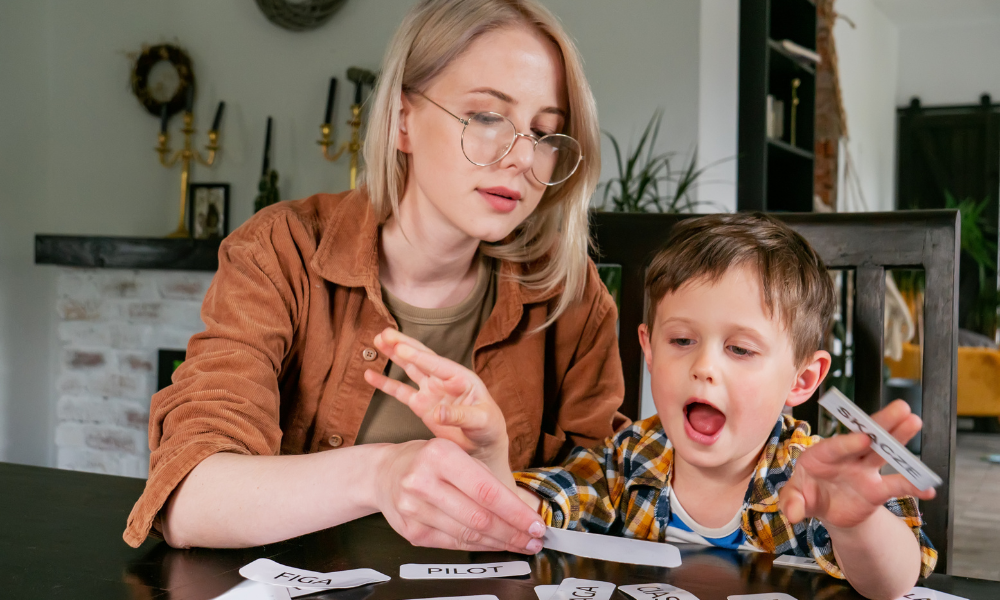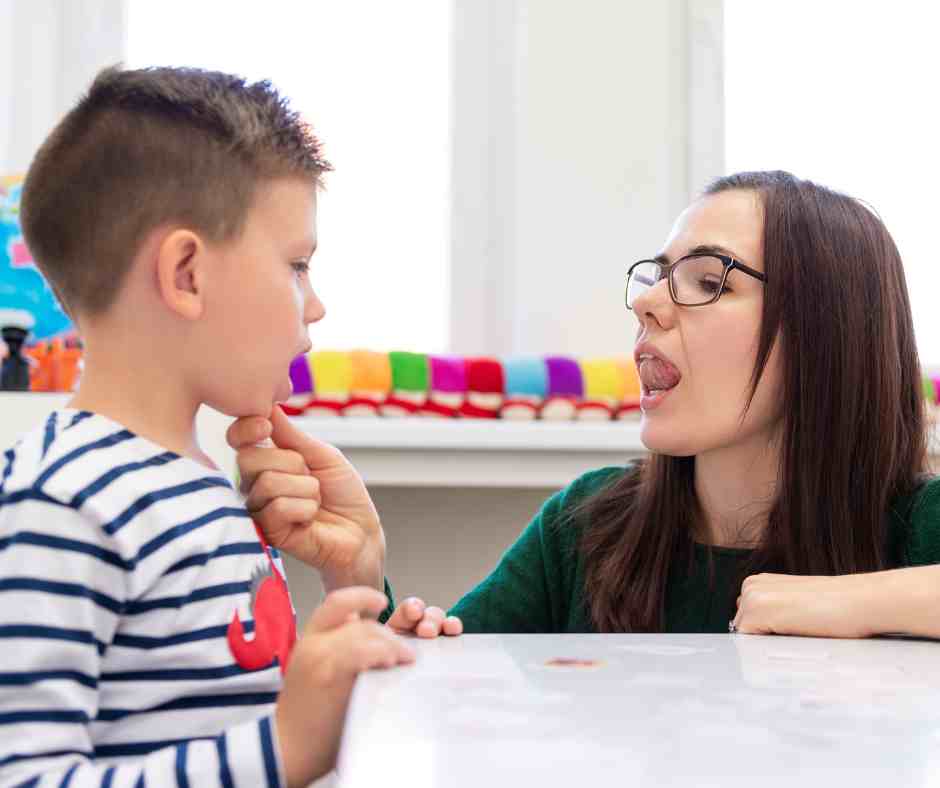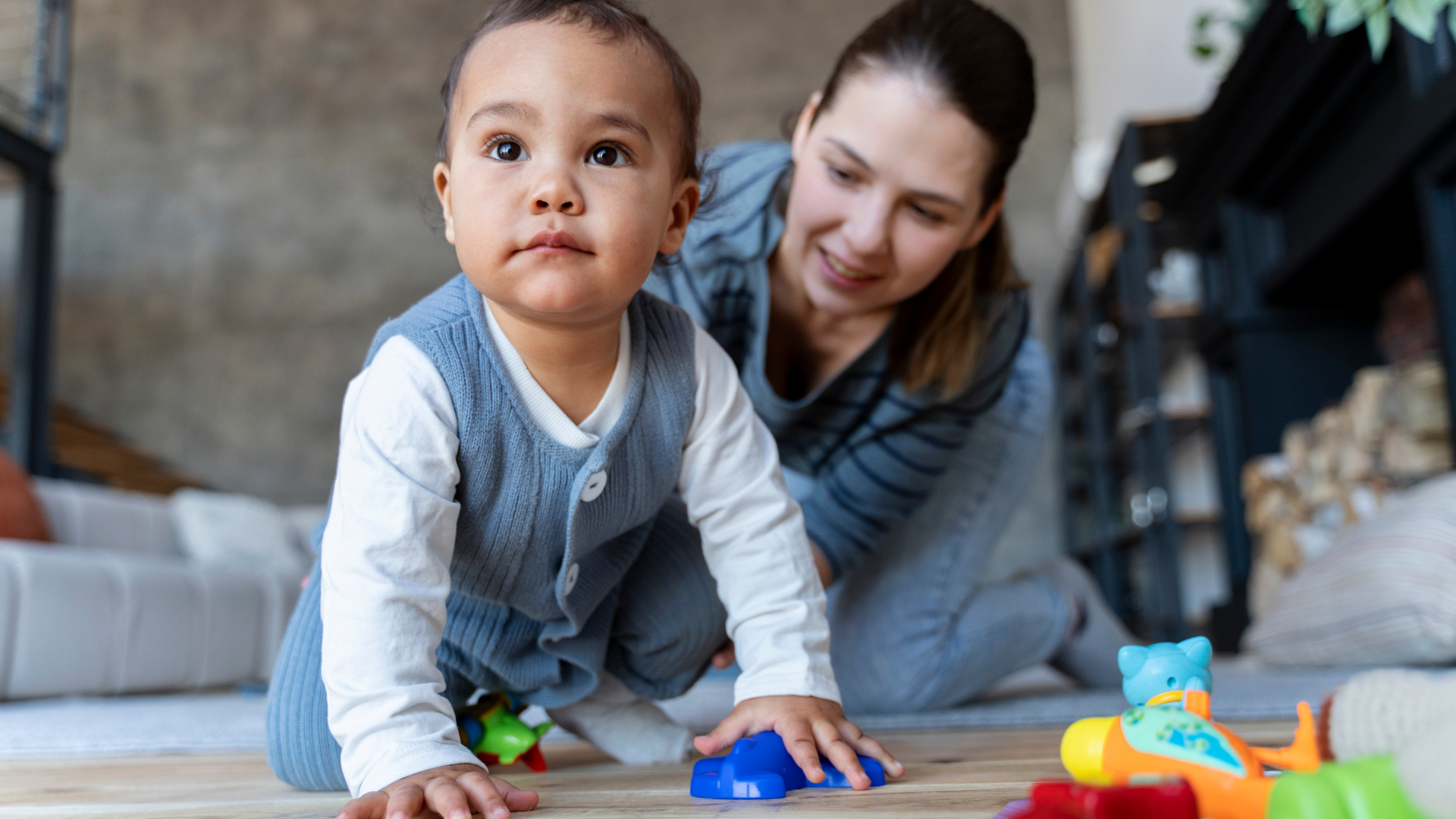Here’s a guide to help you support your child’s speech and language development between 12 and 24 months. We’ll explore the typical stages of communication growth, so you can celebrate your child’s progress and discover fun ways to encourage their learning.
If you have any questions about your child’s speech and language, remember that the team at Esperanza Speech and Occupational Therapy in Dubai is here to help. A chat with a speech and language therapist can provide personalized advice for your child’s unique journey.
Your Child’s Second Year: What to Expect
In their second year, children make incredible leaps in their speech and language abilities. It’s a time filled with exciting new sounds, words, and connections! Just remember, every child is different and develops at their own pace. The following stages offer a general idea of what you might see as your little one finds their voice:
Stage 3 (9–18 Months): Getting the hang of it
Understanding:
Your child is starting to get a real handle on those everyday words like “mummy,” “daddy,” “ball,” and “teddy.” It’s like they’re unlocking a secret code!
They understand words best when they’re used in real-life situations. For instance, they might recognize “bath” when you’re getting the tub ready and splashing the water.
It’s truly amazing how much they take in! At this stage, children typically understand far more words than they can actually say – sometimes up to five times as many. They’re like little sponges, soaking it all up.
Talking:
Your child might begin to put sounds together in a more deliberate way, like “maba” or “gana.” It’s the early experimentation of language..
Gestures become a big part of how they get their meaning across. They’ll point to what they want, shake their head firmly for “no,” and wave a cheerful “bye-bye.”
You might hear their first real words, the ones that make your heart melt, like “mama” or “dada.” And their sounds will become more melodic and intentional, with a clear purpose behind them.
Once a child starts using a word with meaning, they’ll often repeat it with great enthusiasm. For example, they might call every furry, four-legged animal a “woof,” and it’s their special way of categorizing the world.
Stage 4 (12 Months Onwards): Putting it together
Understanding:
Your child will start to understand and respond to simple questions, showing they’re following your train of thought, like “Where is daddy?”
They’ll follow short, one-step instructions, showing they’re ready to cooperate, such as “Bring me your teddy.”
They begin to connect words with the things they see and the things they do every day, like recognizing “dinner” or “yummy” when they see a spoon or plate.
They’ll start pointing to their body parts when you name them, showing their growing self-awareness, and will learn new words at an astonishing rate every week.
Talking:
By now, children typically use around three clear words, such as “mama,” “dada,” and a familiar object name like “car” or “drink.” These are their first building blocks of language.
They’ll still babble away, but it will sound more and more like real speech, with the rhythm and intonation of conversation.
Your child will really enjoy copying familiar words, making animal sounds with gusto, and imitating all those fascinating everyday noises.
Stage 5 (18 Months Onwards): Branching out
Understanding:
Your child will be able to follow two-step instructions, showing their increasing ability to hold information in their mind, like “Give me the spoon and the book.”
They begin to understand simple action words, showing they’re understanding the world of verbs, like “sit down” and “come here.”
They’ll use pointing and gestures even more to express exactly what they want and get your attention in increasingly sophisticated ways.
They can now recognize and name a whole host of familiar objects and pictures, demonstrating their rapidly expanding knowledge.
Talking:
Around this time, children often say “no” and “mine” very clearly (and frequently!) – they’re discovering their independence!
Their vocabulary is really taking off, expanding to include 10–20 words, including the names of all their favorite people and things.
You’ll start to hear those adorable two-word phrases like “all gone” and “daddy bye-bye,” which are their first attempts at forming sentences.
They’ll still babble, but they’ll mix more and more real words into their speech, creating their own unique language blend.
By the time they’re two, many children know and use a remarkable 100–200 words and start putting together short, simple sentences.
Don’t worry if their pronunciation isn’t always perfect – that’s a completely normal part of the learning process. But if you have any concerns or questions, a speech and language therapist can provide expert guidance and reassurance.
Fun Ways to Encourage Speech and Language Development
Listen to Sounds:
Point out and describe the amazing variety of sounds around you, like “That’s the doorbell ringing! Can you hear it?”
Introduce fun and engaging sounds like “uh-oh” when something tumbles, or make all sorts of animal noises like “moo” for a cow and “quack” for a duck.
Take Turns:
Play interactive turn-taking games, like rolling a ball back and forth and cheering each other on, or handing toys to each other with a smile.
When you ask your child a question, pause and wait patiently for their response. This gives them the time and space they need to process and formulate their answer.
Learn New Words:
Use everyday situations, like a trip to the playground, to introduce exciting new words, like “swing,” “slide,” “up,” and “down.”
Help your child learn descriptive words that paint a picture, by saying things like, “Your juice is cold and refreshing” or “That’s a big, powerful truck!”
Categorize Words:
When you’re playing together, group similar items and talk about what makes them alike (e.g., “These are all toys! We have a car, a ball, and a soft teddy”).
At mealtimes, introduce the different food groups and talk about what you’re eating, like “This is yummy fruit! We have an apple and a banana.”
Encourage Communication:
Place your child’s favorite items just slightly out of reach, creating a natural opportunity for them to ask for what they want.
If your child tries to say a word, even if it’s not quite right (e.g., “getty” for “spaghetti”), celebrate their effort! Repeat the word clearly and expand on it in a sentence: “Oh, you’d like more spaghetti? Here you go!”
Play Activities:
Offer a wide variety of textures and objects for your child to explore with their hands and senses, like soft, cuddly toys, shiny mirrors, and musical bells.
Engage in classic interactive games like peek-a-boo, where the anticipation and surprise are key, or hide-and-seek with toys, and imaginative pretend play with dolls and stuffed animals.
Encourage your child to follow moving objects with their eyes, which helps develop their focus and tracking skills. Try blowing bubbles or floating colorful balloons.
Look at Books:
Make reading a special time together every day. Point out the pictures, name the objects, and ask engaging questions like, “Where is the teddy bear? Can you show me?”
Choose books that are interactive and stimulating, with different textures to touch, flaps to lift, or themes that are very familiar to your child.
Nursery Rhymes and Songs:
Sing action songs like “The Wheels on the Bus,” and encourage your child to join in with the movements, gestures, and words.
Playfully pause and let your child fill in the missing words in familiar rhymes and songs, such as “Head, shoulders, knees, and ____toes!”
At Esperanza Speech and Occupational Therapy in Dubai, we’re so passionate about helping children develop their communication skills in a joyful and natural way, through play-based learning. If you have any questions at all, or any concerns about your child’s speech and language development, please don’t hesitate to reach out to us. We’re here to support you and your child with warmth and expertise, every step of the way. Contact us today to schedule a consultation, and let’s explore together how we can help your child reach their full potential and find their voice.



